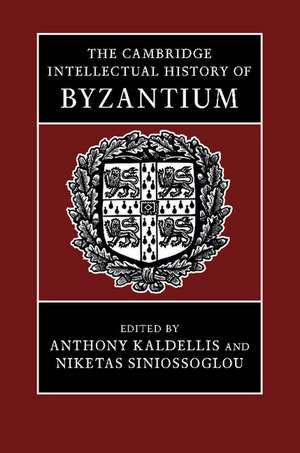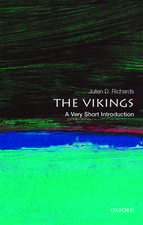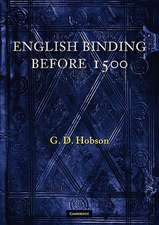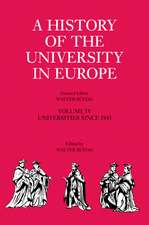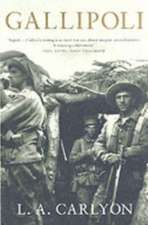The Cambridge Intellectual History of Byzantium
Editat de Anthony Kaldellis, Niketas Siniossoglouen Limba Engleză Hardback – 22 noi 2017
Preț: 1090.53 lei
Preț vechi: 1416.27 lei
-23% Nou
Puncte Express: 1636
Preț estimativ în valută:
208.68€ • 223.14$ • 173.99£
208.68€ • 223.14$ • 173.99£
Carte disponibilă
Livrare economică 28 martie-11 aprilie
Preluare comenzi: 021 569.72.76
Specificații
ISBN-13: 9781107041813
ISBN-10: 1107041813
Pagini: 798
Dimensiuni: 160 x 235 x 38 mm
Greutate: 1.37 kg
Editura: Cambridge University Press
Colecția Cambridge University Press
Locul publicării:New York, United States
ISBN-10: 1107041813
Pagini: 798
Dimensiuni: 160 x 235 x 38 mm
Greutate: 1.37 kg
Editura: Cambridge University Press
Colecția Cambridge University Press
Locul publicării:New York, United States
Cuprins
Introduction Niketas Siniossoglou and Anthony Kaldellis; Part I. The Transmission of Knowledge: 1. Institutional settings: the court, schools, church, and monasteries Jonathan Harris; 2. Byzantine books Inmaculada Pérez Martín; 3. Questions and answers Stephanos Efthymiades; 4. Classical scholarship: the Byzantine contribution Eleanor Dickey; 5. Intellectual exchanges with the Arab world Dimitris Gutas, Anthony Kaldellis and Brian Long; Part II. Sciences of the Word: 6. Rhetoric and rhetorical theory Stratis Papaioannou; 7. Byzantine literary criticism and the classical heritage Manolis Bourbouhakis; 8. Theories of art Charles Barber; 9. Legal thought Bernard Stolte; Part III. Sciences of the World: 10. Conceptions of science in Byzantium Dominic O'Meara; 11. Astronomy Anne Tihon; 12. Astrology Paul Magdalino; 13. Magic and the occult sciences Richard Greenfield; 14. Alchemy Gerasimos Merianos; 15. Medical thought and practice Timothy S. Miller; Part IV. Philosophy and Theology in Middle Byzantium: 16. Philosophy and 'Byzantine philosophy' Dimitris Gutas and Niketas Siniossoglou; 17. The formation of the Patristic Tradition John A. McGuckin; Section 1. Platonic Themes: 18. The Byzantine reception of Neoplatonism Tuomo Lankila; 19. Platonism from Maximos the Confessor to the Palaiologan period Andrew Louth; 20. Fate, free choice, and divine providence from the Neoplatonists to John of Damascus Ken Parry; Section 2. Aristotelian Themes: 21. Logic in Byzantium Christophe Erismann; 22. The presence of Aristotle in Byzantine theology David Bradshaw; 23. Reading and commenting on Aristotle Michele Trizio; Section 3. Individuals in Context: 24. Maximos the Confessor Phil Booth; 25. John of Damascus' philosophy of the individual and the theology of icons Anna Zhyrkova; 26. Michael Psellos David Jenkins; 27. Trials of philosophers and theologians under the Komnenoi Michele Trizio; Part V. Philosophy and Theology in Late Byzantium: 28. Theological debates with the West, 1054–1300 Tia Kolbaba; 29. The Hesychast controversy Norman Russell; 30. Orthodox mystical theology and its intellectual roots Andrew Louth; 31. Kabbalah in Byzantium Moshe Idel; 32. Aquinas in Byzantium Marcus Plested; 33. Theology, philosophy, and politics at Ferrara-Florence Marie-Hélène Blanchet; Part VI. Politics and History: 34. Basileia: the idea of monarchy in Byzantium, 600–1200 Paul Magdalino; 35. Historiography as political debate Dimitris Krallis; 36. Theories of decline from Metochites to Ibn Khaldun Teresa Shawcross; 37. Plethon, Scholarios, and the late Byzantine state of emergency Niketas Siniossoglou; 38. The Byzantine legacy in early modern political thought Paschalis M. Kitromilides; Bibliography; Index of names; Subject index.
Recenzii
'It brings a great deal of clarity to a murky field, especially for an outsider, and should indeed serve as an excellent platform from which the growing field of Byzantine intellectual history might expand. The volume as a whole feels well thought out and well rounded in its execution. It is a most welcome addition to the corpus of modern Byzantine studies and should remain both a useful reference and an excellent teaching tool for years to come.' Nathan Leidholm, H-Ideas
Descriere
The first ever authoritative exploration of the life and evolution of ideas in Byzantium from the seventh to the fifteenth century.
